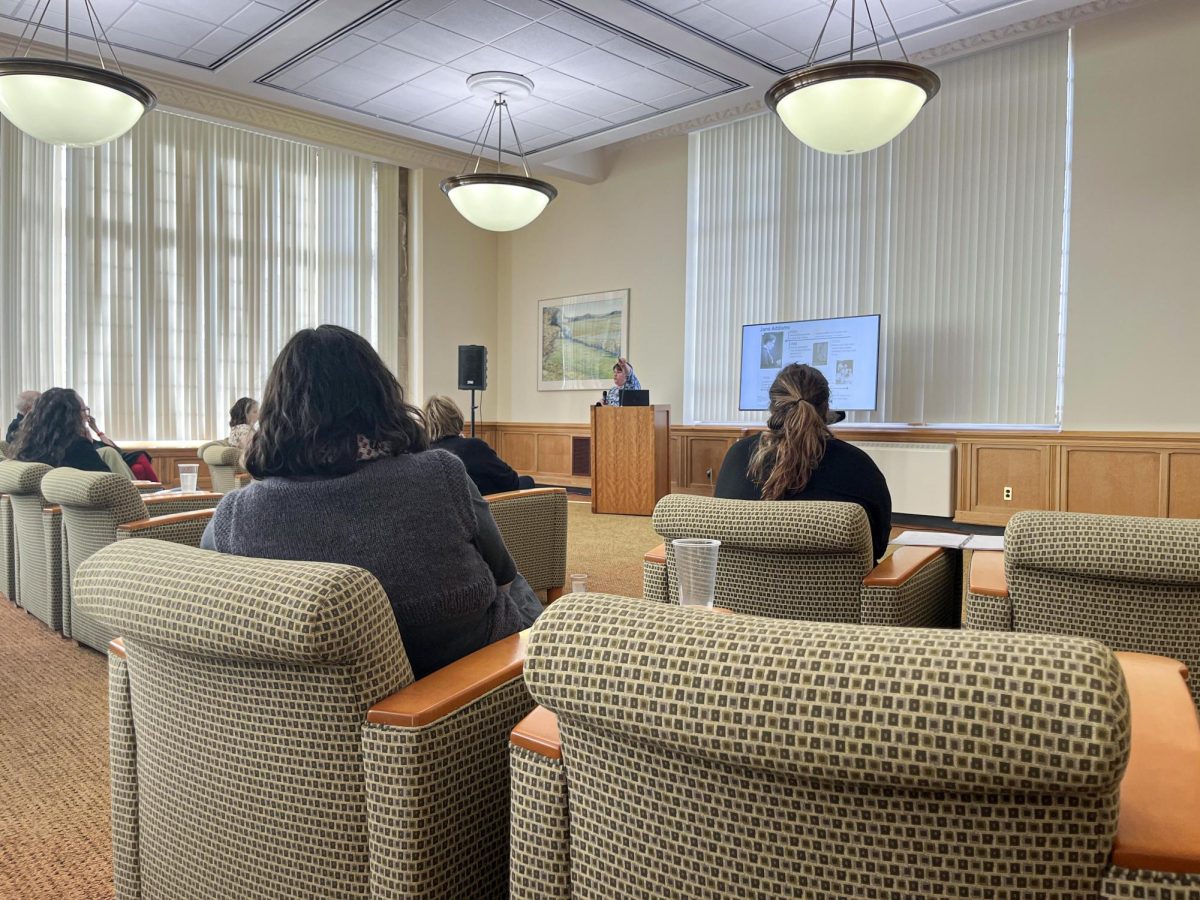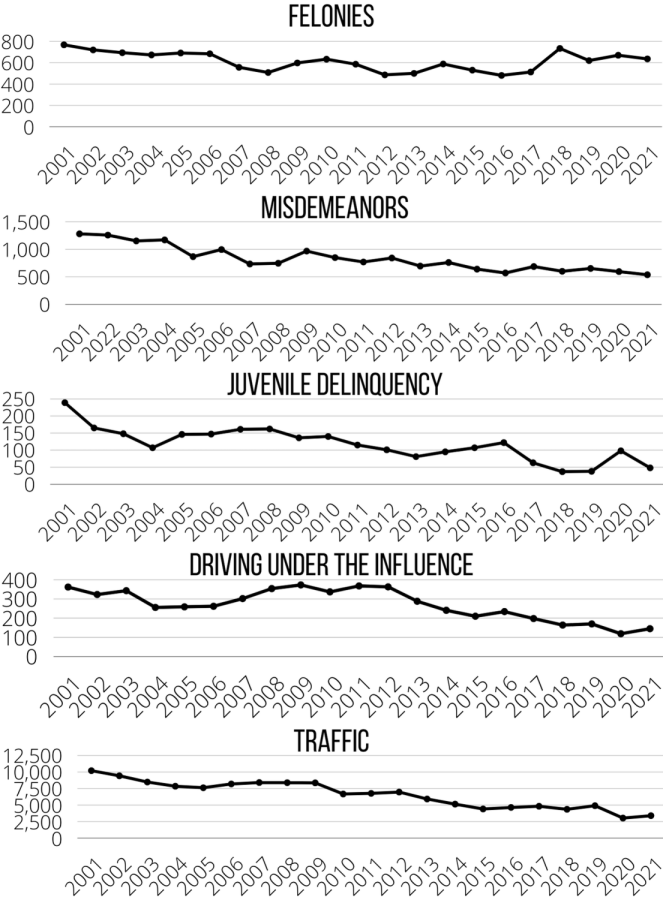Meth possession most common felony in Coles County
March 29, 2022
Meth possession was the most common felony committed in Coles County in 2021.
As has been the case for the past 20 years, the felony numbers in Coles County continue to fluctuate, as 2021, with 636 felonies, is neither the highest or lowest total since 2001. The highest belongs to 2001, at 768, and the lowest came in 2016, with 481.
Of last year’s 636 felonies, possession of meth in quantities less than five grams was the most common felony by far, accounting for 177 felonies, or roughly 28 percent.
Eighty-eight of the less than five grams meth possession charges came from Mattoon and 55 came from Charleston.
Coles County State’s Attorney Jesse Danley identified the highest percentage of methamphetamine users to be white males, ages 19 to 23.
The second-most common was domestic battery with other priors with 52 cases, and like the possession of meth charges, Mattoon saw more cases than Charleston with 21 and 14, respectively.
“I think that one, the domestic starts over an argument and then escalates, and then the police are called, and then he or she will get arrested,” said Melissa Hurst, Coles County’s Circuit Clerk.
Similar to those who relapse in drug cases, Hurst noted that victims of domestic violence often call the police to report the event and try to get orders of protection, but then return to the courthouse weeks later asking for the cases to be dismissed.
Hurst, who has been working in the Coles County courthouse since 1996, has been circuit clerk since 2012.
“Domestic (battery) is always a problem,” Hurst said. “And we get a lot of domestics after holidays. Holidays, long weekends, when people are together.”
Among the common felonies were burglaries that didn’t cause damage with 21 and burglaries with 14.
Hurst said this is likely related to the drug use in the county, estimating that 80 percent of burglary charges are drug-related.
“You’ll have burglaries or you’ll have thefts,” Hurst said. “They’re either trying to get money to go buy more drugs… so it’s not just a drug charge, there could be multiple charges within that one case, but a lot of it’s because it’s drug-related.”
Judge Mitchell Shick, a circuit judge for Coles County, also attributed much of the burglaries as being drug and addiction-related, saying that it can involve looking for things to “pawn to get their drugs.”
“I would say predominantly those types of offenses, burglary, are all related to addiction issues,” Shick said.
Hurst also noted the drug court offered in Coles County, which provides those who have drug problems with a way to address such problems in groups, and mentioned that they have sponsors who they can reach out to if they are worried about relapsing.
Shick said that around 2004, the model was to find the addict and punish them by putting them in jail, both in Coles County and around the country. A meeting with the state’s attorney, probation officer and chiefs of police showed them that for non-violent users, treatment should be the focus.
“Treatment is the key,” Shick said. “If the person is a non-violent offender, it doesn’t do any good to simply throw them into prison, even if they continue to use.”
However, Hurst added that drug court is not a one-time fix for everybody.
“Unfortunately, sometimes after they’ve graduated, they fall right back into it, because if you’re running with the same crowd, or the people that you were that got you into trouble, then that doesn’t always help,” Hurst said.
Danley told a story of a conflict that started on social media and turned violent, involving a teenager who used a fake bill in a drug deal. The teenager exchanges words on social media with the drug supplier and decides to act on it, shooting a gun at a house multiple children were living in.
Danley used this anecdote to illustrate the negative effects social media can have in leading to violence.
“But there’s something about people’s lack of accountability when they’re talking to their peers and colleagues, and respect goes right out the window,” Danley said.
Danley, who has been serving in public office since 2012, pointed to social media as one of the roots of crime during his time.
“If I could point to one thing that has been a catalyst to crime and just violent crime, it’s social media,” Danley said. “I despise it.”
Ryan Meyer can be reached at 581-2812 or at rameyer@eiu.edu.









![[Thumbnail Edition] Eastern Illinois University baseball's hitting coach and recruiting coordinator Mike Pugliese urges players on the team to increase their effort after a slow start to its pregame routine at the team's first intrasquad scrimmage of the season at O'Brien Field on Jan. 31, 2025.](https://www.dailyeasternnews.com/wp-content/uploads/2025/03/BB_02_O-1-e1741909628540-1200x702.jpg)
![[Thumbnail Edition] Senior tennis player Luisa Renovales Salazar hits the tennis ball with her racket at the Darling Courts at the Eastern Illinois University campus in Charleston, ILL.](https://www.dailyeasternnews.com/wp-content/uploads/2025/03/Tennis_01_O-1-e1741807434552-1200x670.jpg)
![[Thumbnail Edition] Senior right-handed pitcher Tyler Conklin pitching in the Eastern Illinois University baseball team's intrasquad scrimmage at O'Brien Field in Charleston, Illinois on Jan. 31.](https://www.dailyeasternnews.com/wp-content/uploads/2025/03/TC_01_O-e1741567955534-1200x669.jpg)





![[Thumbnail Edition] Senior, forward Macy McGlone finds an open teammate to pass the ball too during the game against the Tennessee State Tigers 69-49, in Groniger Arena on the Eastern Illinois University campus, Charleston Ill.](https://www.dailyeasternnews.com/wp-content/uploads/2025/03/WBB_02_O-1-e1741228987440-1200x692.jpg)


















![E[Thumbnail Edition] Eastern Illinois softball freshman utility player Abbi Hatton deciding to throw the softball to home plate in a fielding drill during softball practice at the field house in Groniger arena on Tuesday Feb. 11.](https://www.dailyeasternnews.com/wp-content/uploads/2025/03/SB_03_O-e1741208880750-1-e1741209739187-1200x815.jpg)















![The Weeklings lead guitarist John Merjave [Left] and guitarist Bob Burger [Right] perform "I Am the Walrus" at The Weeklings Beatles Bash concert in the Dvorak Concert Hall on Saturday.](https://www.dailyeasternnews.com/wp-content/uploads/2025/03/WL_01_O-1200x900.jpg)
![The team listens as its captain Patience Cox [Number 25] lectures to them about what's appropriate to talk about through practice during "The Wolves" on Thursday, March 6, in the Black Box Theatre in the Doudna Fine Arts Center in Charleston, Ill.](https://www.dailyeasternnews.com/wp-content/uploads/2025/03/WolvesPre-12-1200x800.jpg)





















